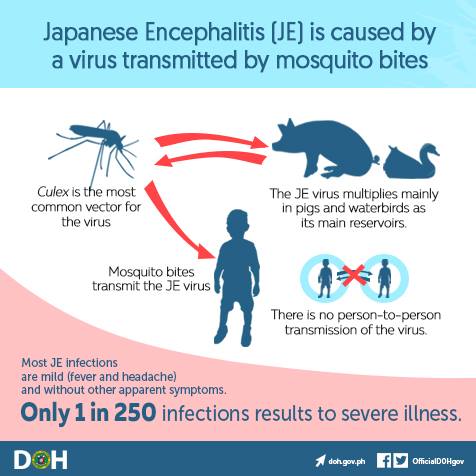In a follow-up on the Japanese encephalitis situation in Taiwan, the Taiwan Centers for Disease Control (Taiwan CDC) announced 7 new Japanese encephalitis cases confirmed in Taiwan last week.

The new cases include one each in Daya District, Taichung City, Xizhou Township, Changhua County, Puzi City, Chiayi County, District, Guiren District, Tainan City, Fengshan District, Kaohsiung City, Xiaogang District, Kaohsiung City, and Linyuan District, Kaohsiung City.
The 7 new cases age between 17 and 70, and their onset dates vary between May 19 and June 5. During the period of communicability, they developed symptoms such as fever, headache, and consciousness disturbance. As of now, 3 cases are hospitalized in the intensive care unit for treatment, 2 cases are hospitalized in the general ward in stable condition, and 2 cases have been discharged.
According to the epidemiological investigation, all 7 cases either live or work near a high risk environment where there are pigpens, pigeon farms, rice paddy fields or irrigation canals.
Thus far this year, as June 12, 2018, a total of 12 Japanese encephalitis cases, including 6 in Kaohsiung City, 2 in Chiayi County, 1 in Pingtung County, 1 in Tainan City, 1 in Changhua County, and 1 in Taichung City, have been confirmed in Taiwan. All 12 cases live in or work near a high risk environment where there are vector breeding sites nearby.
As the Japanese encephalitis season (May-October) has arrived, Taiwan CDC advises people who frequent mosquito-prone areas such as pig farms and rice paddy fields to take precautions against mosquito bites and ensure age-appropriate children receive Japanese encephalitis vaccination in a timely manner in order to ward off infection.
Deals in Venice: Save up to 40% in Tours & Sightseeing
- Hong Kong reports domestic cluster of measles
- Lyme research: East Carolina University researcher receives NIH grant to study Borrelia motility
- Los Angeles County reports 1st human West Nile virus case of 2018
- S. Alberta reports increase in gonorrhea
- Cyclospora update: Dozens of cases reported in Minnesota and Wisconsin
- Red Cross seeks millions to fund emergency response to DR Congo Ebola virus outbreak


One thought on “Japanese encephalitis cases rise to a dozen in Taiwan”